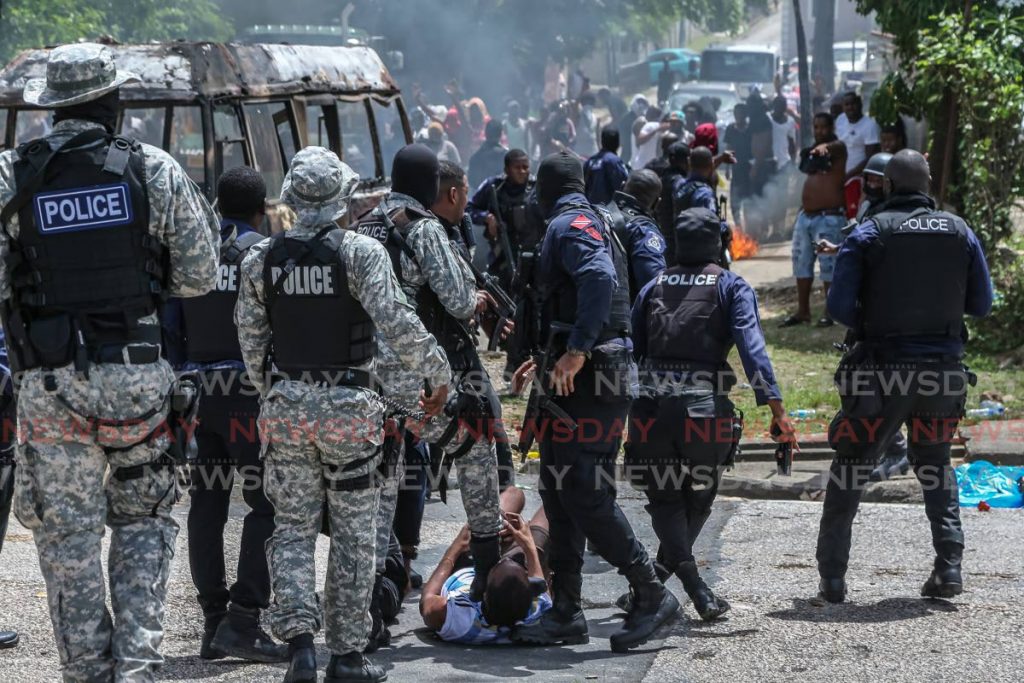Restoring order or fixing injustice: a false choice

kmmpub@gmail.com
We can restore law and order and fix injustice at the same time. We must not fall for the false choice between accepting destruction and violence in the name of social justice or sacrificing the vulnerable in the name of order.
Let me pose a few simple questions and tell me if you agree with them.
Do you think crime is a problem? Do you think gang murders are wrong? Do you think murders of innocent children are wrong? Do you think that poor people disproportionately feel the effects of crime? Do you think theft and destruction is wrong? Do you think attacking the police is wrong?
When presented in isolation, almost everyone answers “yes” to these questions. That’s because it is the sensible answer. Now here’s a second set of questions.
Do you think police killing unarmed people is wrong? Do you think extra-judicial killings are wrong? Do you think locking up people for months or years without trial and conviction is wrong? Do you think it is wrong that it is much more expensive, confusing and difficult for a poor person to find justice through our courts? Do you think it is wrong that between half and three quarters of prisoners go on to re-offend?
The irony is that when asked separately, almost everyone who agrees with the first set of questions almost always agrees with the second set.
If you agree with the first set of questions, then regardless of whether you stand against injustice or not, you must support the police’s swift move to quell destructive protest elements and keep the country safe – not to mention prevent the spread of covid-19.
If you agree with the second set of questions, then regardless of what you think about the motives or justifications of any set of protesters, you must demand quick action for the government and the judiciary to face and address injustice.
It turns out that the same reforms that support vulnerable people to fight injustice also support the police’s efforts.
First, the police should ensure that any attempts at violence or destruction of property are stopped. People and businesses must feel safe: especially the vulnerable communities which are the most affected.
Change must start with prevention. We must serious invest in targeted programmes to use data, psychology and therapy to prevent crime while connecting people to social support. The less crime, the less potential for flash points.
Prevention also means firing police officers charged with violent crimes and auditing the Police Complaints Authority to ensure that people can count on it to deliver justice. It is in the police’s own interest to tackle rogue elements and bolster their legitimacy in at-risk communities.
The Police Commissioner has repeatedly called for an investigation into the persistent government funding of organised crime through contracts and the abuse of welfare programmes. The Government must actively work with the police to ensure no criminal is being funded by the state and publish the results to the public. The simplest way of doing this is to give more welfare payments directly to recipients.
The greatest injustice lies in the courts themselves. The Judiciary must move much faster to automate its moribund systems and move online. More cases must be submitted for arbitration before trial. We should move dramatically towards specialised courts and lessen the backlog. This will help everyone: our police, our prisons officers, unjustly imprisoned people and the victims of crime.
Terrible prison conditions are systematically educating criminals. Yet there is a way out: Uruguay’s National Criminal Rehabilitation Centre has a reoffending rate of 12 per cent.
We must fast-track the introduction of parole; and invest in the people and technology we need to monitor paroled prisoners and put them through rehabilitation.
There is so much that can and must be done that is totally uncontroversial. Everyone wants the police to do their job and keep us safe. Everyone wants justice for the poor and downtrodden.
Do not be fooled into making false choices between one side or the other. It is perfectly possible for us to listen to the protesters (regardless of their motives or actions) and address the underlying problems they have raised – while at the same time supporting our police’s efforts to keep us safe.
We must move beyond our mood affiliations and support sensible crime prevention, justice system reform, and rehabilitation. This is not a zero-sum game. The longer we waste time in accusations and recriminations, the more these problems will fester and erupt. We must not be distracted: we must act.
Kiran Mathur Mohammed is a social entrepreneur, economist and businessman. He is a former banker, and a graduate of the University of Edinburgh

Comments
"Restoring order or fixing injustice: a false choice"